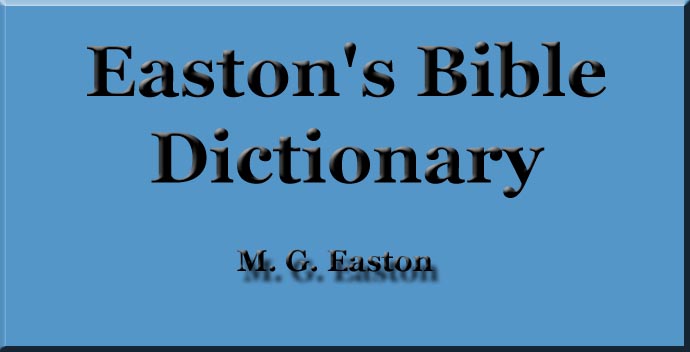

Treasury (Mat 27:6; Mar 12:41; Joh 8:20). It does not appear that there was a separate building so called. The name was given to the thirteen brazen chests, called "trumpets," from the form of the opening into which the offerings of the temple worshippers were put. These stood in the outer "court of the women." "Nine chests were for the appointed money-tribute and for the sacrifice-tribute, i.e., money-gifts instead of the sacrifices; four chests for freewill-offerings for wood, incense, temple decoration, and burnt-offerings" (Lightfoot's Hor. Heb.).
Tree of the Knowledge of Good and Evil Stood in the midst of the garden of Eden, beside the tree of life (Gen. 2, 3). Adam and Eve were forbidden to take of the fruit which grew upon it. But they disobeyed the divine injunction, and so sin and death by sin entered our world and became the heritage of Adam's posterity. (See ADAM.)
Tree of Life Stood also in the midst of the garden of Eden (Gen 2:9; Gen 3:22). Some writers have advanced the opinion that this tree had some secret virtue, which was fitted to preserve life. Probably the lesson conveyed was that life was to be sought by man, not in himself or in his own power, but from without, from Him who is emphatically the Life (Joh 1:4; Joh 14:6). Wisdom is compared to the tree of life (Pro 3:18). The "tree of life" spoken of in the Book of Revelation (Rev 2:7; Rev 22:2, Rev 22:14) is an emblem of the joys of the celestial paradise.
Trespass Offering (Heb. 'asham , "debt"), the law concerning, given in Lev. 5:14 - 6:7; also in Num 5:5. The idea of sin as a "debt" pervades this legislation. The asham, which was always a ram, was offered in cases where sins were more private. (See OFFERING.)
Tribe A collection of families descending from one ancestor. The "twelve tribes" of the Hebrews were the twelve collections of families which sprang from the sons of Jacob. In Mat 24:30 the word has a wider significance. The tribes of Israel are referred to as types of the spiritual family of God (Rev. 7). (See KINGDOM OF ISRAEL; OF JUDAH.)
Tribulation Trouble or affliction of any kind (Deu 4:30; Mat 13:21; Co2 7:4). In Rom 2:9 "tribulation and anguish" are the penal sufferings that shall overtake the wicked. In Mat 24:21, Mat 24:29, the word denotes the calamities that were to attend the destruction of Jerusalem.
Tribute A tax imposed by a king on his subjects (Sa2 20:24; Kg1 4:6; Rom 13:6). In Mat 17:24 the word denotes the temple rate (the "didrachma," the "half-shekel," as rendered by the R.V.) which was required to be paid for the support of the temple by every Jew above twenty years of age (Exo 30:12; Kg2 12:4; Ch2 24:6, Ch2 24:9). It was not a civil but a religious tax. In Mat 22:17, Mar 12:14, Luk 20:22, the word may be interpreted as denoting the capitation tax which the Romans imposed on the Jewish people. It may, however, be legitimately regarded as denoting any tax whatever imposed by a foreign power on the people of Israel. The "tribute money" shown to our Lord (Mat 22:19) was the denarius, bearing Caesar's superscription. It was the tax paid by every Jew to the Romans. (See PENNY.)
Trinity A word not found in Scripture, but used to express the doctrine of the unity of God as subsisting in three distinct Persons. This word is derived from the Gr. trias , first used by Theophilus (A.D. 168-183), or from the Lat. trinitas , first used by Tertullian (A.D. 220), to express this doctrine. The propositions involved in the doctrine are these: (1.) That God is one, and that there is but one God (Deu 6:4; Kg1 8:60; Isa 44:6; Mar 12:29, Mar 12:32; Joh 10:30). (2.) That the Father is a distinct divine Person ( hypostasis, subsistentia, persona, suppositum intellectuale ), distinct from the Son and the Holy Spirit. (3.) That Jesus Christ was truly God, and yet was a Person distinct from the Father and the Holy Spirit. (4.) That the Holy Spirit is also a distinct divine Person.
Troas A city on the coast of Mysia, in the north-west of Asia Minor, named after ancient Troy, which was at some little distance from it (about 4 miles) to the north. Here Paul, on his second missionary journey, saw the vision of a "man of Macedonia," who appeared to him, saying, "Come over, and help us" (Act 16:8). He visited this place also on other occasions, and on one of these visits he left his cloak and some books there (Co2 2:12; Ti2 4:13). The ruins of Troas extend over many miles, the site being now mostly covered with a forest of oak trees. The modern name of the ruins is Eski Stamboul i.e., Old Constantinople.
Trogyllium A town on the western coast of Asia Minor, where Paul "tarried" when on his way from Assos to Miletus, on his third missionary journey (Act 20:15).